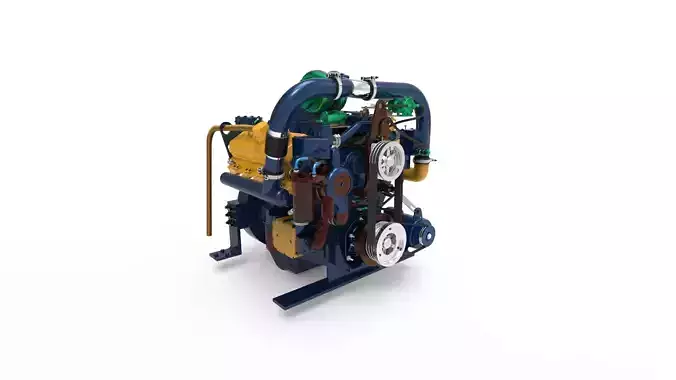1/4
A marine diesel engine is a type of internal combustion engine specifically designed for use in marine environments, powering various types of watercraft such as ships, boats, and yachts. These engines are known for their reliability, efficiency, and robust construction, making them a popular choice for marine propulsion.
Marine diesel engines operate on the principle of compression ignition, where fuel is injected into the combustion chamber and ignited by the heat generated during compression. This combustion process produces the necessary power to drive the engine and propel the vessel through the water. Compared to gasoline engines, marine diesel engines offer several advantages, including higher fuel efficiency, longer service life, and better torque at low speeds.
One of the key features of marine diesel engines is their ability to withstand the harsh marine environment. They are designed to operate reliably even under demanding conditions such as high humidity, saltwater exposure, and constant vibrations. The components of marine diesel engines are made from corrosion-resistant materials such as stainless steel and aluminum alloys to ensure longevity and durability.
Marine diesel engines are available in various configurations to meet different power requirements. They range from small engines used in recreational boats to large engines that power commercial vessels and even naval ships. The power output of a marine diesel engine is typically measured in horsepower or kilowatts, and the engines can be single-cylinder or multi-cylinder, depending on the size and application.
Proper maintenance and regular servicing are essential to ensure the optimal performance and longevity of marine diesel engines. This includes regular oil changes, fuel system maintenance, and inspection of engine components for wear and tear. Additionally, marine diesel engines should be operated within their specified operating parameters to prevent excessive strain and overheating.
Safety is a top priority when dealing with marine diesel engines. They are equipped with safety features such as emergency shutdown systems, fire suppression systems, and exhaust gas monitoring to prevent accidents and ensure the safety of the vessel and its occupants.
In conclusion, marine diesel engines are reliable and efficient power sources for marine propulsion. Their robust construction, fuel efficiency, and ability to withstand harsh marine conditions make them a popular choice in the maritime industry. Proper maintenance and adherence to safety guidelines are essential to ensure the smooth operation and longevity of marine diesel engines, contributing to the safe and efficient navigation of vessels at sea.
REVIEWS & COMMENTS
accuracy, and usability.




